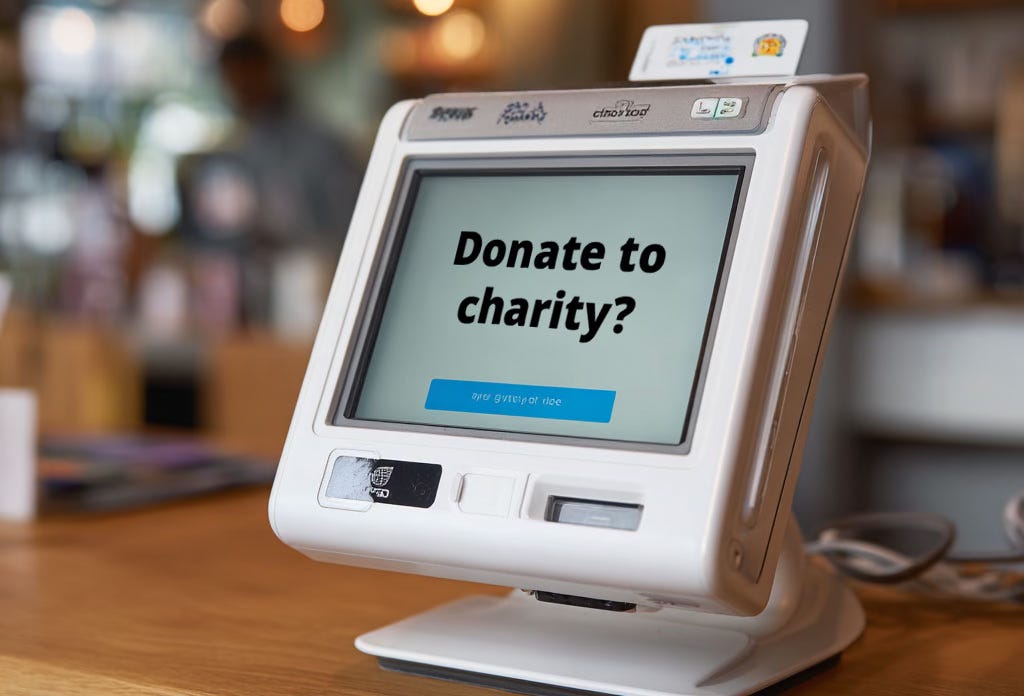Think twice before rounding up to support that Point-of-Sale charity...
Point of sale charities lack transparency and often
Did you ever wonder why these point-of-sale charities have become so ubiquitous?1 You know, when you’re paying at checkout and the thing asks you if you want to round up to support some charity.
The answer is because it’s big money. 44% of us feel we’re being pressured to give to this cause, whatever it is — thus many of us do. In 2022, $749 million was raised in this manner, and that only counts the charities that received over $1 million.2 Since this began, $6.7 billion has been raised by pressuring shoppers into rounding up at the register. The main reason is that the retailer receives 2-7% of the donations.
And who are what are we rounding up for? It’s never a charity we’ve heard of; it’s always a cause that sounds magnanimous. Usually it’s a charity that pays the retailer well — which means less of your money is going to the programs you assume that charity spends on. But sometimes, it’s darker than that:
CVS was sued in 2022 for advertising that they gave $10 million to the American Diabetes Association. In fact, they gave nothing. They used the money you gave them at checkout to cover their pledge; making their ads deceptive.
In 2025, Maxi grocery stores in Quebec were found to be rounding up checkout receipts without any customer consent to something called the President’s Choice Children’s Charity.
Indigo bookstore chains offered a point-of-sale charity called The Love of Reading Foundation. Sounded great to customers who felt wonderful when they rounded up. What they didn’t know was that schools receiving these funds were allowed to use them only at Indigo by paying full retail — in effect, more for-profit business for Indigo, out of your pocket. It’s called a Circular Funding Scheme.
But the most insidious is also the least specific:
Many POS charities are managed by the retailers themselves. They set up a charity and then do four basic things to benefit their own bottom line:
Take unusually large “administrative fees” from it;
Use the donation totals for their own PR, like CVS did above;
Claim tax benefits;
And then decide for themselves which charities their charity will send the money to. (No matter what their name is, they can give the money to whatever charity they want.)
You see, you don’t know. A lot of retailers use a third party facilitator called Round It Up America, which completely obscures the ultimate recipient of your funds.
Here are some major retailer chains whose POS charities are managed by themselves:
Walmart
Target
Home Depot
CVS
Starbucks
Nike
Coca-Cola
I’m not saying they’re shady; I’m merely pointing out that since they operate these charities themselves, they have total control over management fee structures and where the money actually goes. You don’t. And there’s rarely any transparency.
So if you feel pressured to round up at checkout next time…
Don’t.
If you like the name of the charity displayed on the register, and feel you want to support that cause with your money, don’t do it like this. Find a highly rated charity that serves that cause and donate directly to them. You can check out a charity at GiveWell, Charity Navigator, or the Wise Giving Alliance. Find one that spends at least 75% of its revenue on programs; less than 25% on overhead; and that spends less than $25 to raise $100.
You don’t know any of these things at checkout. The charity displayed could be anything between decent and a total scam. But even in the best case a portion of your donation is going to support the POS donation ecosystem, and another portion going to the retailer itself — and that’s not the place to throw your money.
https://www.cbc.ca/news/business/checkout-donations-poor-transparency-about-where-the-money-goes-1.2963923
https://www.npr.org/2024/03/10/1236458377/charity-roundup-donations-stores-fundraising



So is that “POS” in both meanings of the term?
The World Wildlife Federation saves endangered species by saving their habitats, promoting biodiversity.